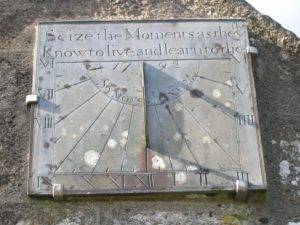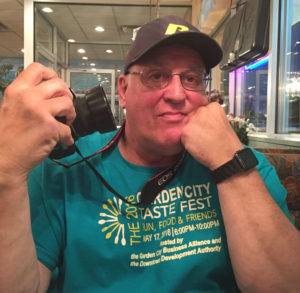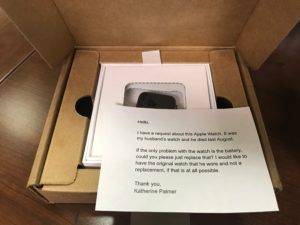 I just unpaired my husband’s Apple Watch from his iPhone. He loved that watch, so it hurt to do it. It’s just one more task to take care of after his death, one more step forward as I work through my grief.
I just unpaired my husband’s Apple Watch from his iPhone. He loved that watch, so it hurt to do it. It’s just one more task to take care of after his death, one more step forward as I work through my grief.
It’s interesting how today’s state-of-the-art technology affects my grieving process. I picture my grandmother and wonder what her emotional triggers would have been after the death of her mate. She probably got teary-eyed when she looked at old photo albums, or the pipes he used to smoke, when she looked down at her wedding ring, or just maybe, when she looked at his old stopwatch and watch fob.
Those types of memorabilia affect me, too, but with a more modern spin: digital photos, videos, websites he designed, his iPhone containing all his games, ebooks, audiobooks, and text messages… and his Apple Watch.
Rick was a technophile. He had the first iPod, the first iPad, the first Android phone, and then he switched to the iPhone, and once he made the switch, he decided to try the Apple Watch. I thought it was an interesting gadget, but wasn’t as impressed as he was. Nevertheless, he was excited to buy this new toy, and one thing I loved about Rick was his enthusiasm for just about everything in life, including new technology.
At the time, neither of us realized that in a few short months, he would be diagnosed with small cell lung cancer, and that this would be his last tech purchase.

So, Rick got his Apple Watch and he loved it! He enjoyed getting the zen-like messages reminding him to “breathe.” He liked glancing down and being able to read his texts anywhere, anytime, or looking to see who was calling when he didn’t want to pull out his phone in company. He was always fiddling with it, showing me apps he was trying, and enjoying each new discovery about what his new toy could do. His enthusiasm was infectious, and I was happy that he was so tickled with the watch during the months he suffered through the tests, chemo, transfusions, and radiation, and then the treatments’ side effects.
As Rick grew weaker over the last three months of his life, he was hospitalized quite a few times. On one of those occasions, as he lay in the emergency room bed, he asked if I’d like to wear his watch while he was in the hospital.
I didn’t know how to react. Did he have a premonition that he wouldn’t make it? Why would he offer his beloved watch to me now? The idea of separating him from the watch that was always on his wrist, and that was now so much a part of him, depressed me. I was suffering from what I now know was anticipatory grief, and I didn’t want to be reminded about a time in the future where I’d be sorting his things, putting away his gadgets. But I saw that he wanted me to wear it, and I knew that it would make him happy if I did.
I tentatively agreed to pair the watch with my iPhone until he was released. I said it would give me an opportunity to test it out for myself, to see if I wanted to get one. I ended up having the watch for about three days, and then I quite happily returned it to him.
And now he’s gone. And I have his watch forever.
But, oddly, when I first picked up the watch about two weeks after his death, it wouldn’t work. It just wouldn’t turn on, or charge at all. I tried it on a different charger, I tried resetting it. Nothing.
And then a very old memory came back to me. I thought back to the old song we used to sing in grade school, My Grandfather’s Clock. I remember as a young girl becoming sad as we sang it in music class. I guess I’ve always been an old soul. I’m the family genealogist. History and death and cemeteries have always been of interest, and this quiet dirge made me think about the transience of life and the imminence of death even as a young girl.
My grandfather’s clock was too large for the shelf,
So it stood ninety years on the floor;
It was taller by half than the old man himself,
Though it weighed not a pennyweight more.It was bought on the morn of the day that he was born,
And was always his treasure and pride;
But it stopped short — never to go again —
When the old man died…It rang an alarm in the still of the night,
An alarm that for years had been dumb
And we knew that his spirit was pluming for flight
That his hour of departure had comeStill the clock kept the time
With a soft and muffled chime
As we silently stood by his side
But it stopped, short, never to go again
When the old man died.
As the song played in my head, I had an odd thought – just as the grandfather clock had died in this song from more than a century ago, this Apple Watch stopped, never to go again, when my husband died. I’m not sure when it stopped. It was on his desk at home the weekend he died in the hospital. Did it stop when he took his last breath? As “his spirit was pluming for flight”? It’s difficult to imagine relating this technological marvel to the old grandfather’s clock in the ancient song, but in matters of death and the spirit, my mind tends to ponder just about everything.
Of course, this being the 21st century, and me being a practical consumer, I will return the watch to the repair center to see if it can be fixed. I want to wear it. I want this reminder of my tech-savvy husband. I know he’d be happy that I decided to use it.
 So today, in preparation for sending it out for repair, I followed the directions and unpaired the watch from his iPhone (yes, eight months after his death, I still haven’t turned in his phone, but that’s another story). When I send the watch, I’ll include a little note asking the tech guys if they could please, please, please just swap out the battery, if possible. Please, please, please send back the exact same watch. His watch. The watch that encircled his large, strong wrist, and touched his warm, soft skin while he was still alive. The watch that made him smile when there wasn’t a lot to smile about. The watch he fiddled with.
So today, in preparation for sending it out for repair, I followed the directions and unpaired the watch from his iPhone (yes, eight months after his death, I still haven’t turned in his phone, but that’s another story). When I send the watch, I’ll include a little note asking the tech guys if they could please, please, please just swap out the battery, if possible. Please, please, please send back the exact same watch. His watch. The watch that encircled his large, strong wrist, and touched his warm, soft skin while he was still alive. The watch that made him smile when there wasn’t a lot to smile about. The watch he fiddled with.
The watch that reminded him to breathe.
I know it’s not important, but it means something to me, to keep these small connections to him as long as I can. I know the tech guys will probably toss the note without reading it. If they do read it, they’ll think it’s silly. But I can hope. I can try.
So many small things become significant now that he’s gone. So many tiny things can make or break my spirit.
Yes, I am moving on, eight months after Rick’s death. Yes, I am trying to find my new normal. But I still grasp at any means to keep our connection, and it’s important to me, very important, that I wear his Apple Watch.


Thank you for sharing. I still have my husbands phone on and he died 5-27-17.
I loved this – thank you. Right now, I can’t seem to disconnect my husband’s cell phone number, so I just keep paying the bill as if he might come back and call me one more time.
Thank you, Dani. Yes, I continue to pay $75 per month to keep my husband’s phone activated. It was so much a part of his life, that it’s difficult to give it up. I also want to keep his years of text messages, so I’m working to preserve those and trying different apps to see which one works the best. I know I can’t keep up this “useless” expense, but it’s one of my last connections, whether it’s logical or not. I even texted him when he was sedated and on a breathing tube the night before he died, because I just felt like it may be a way to speak to him!
We do what we need to do to survive this pain. Sending hugs your way.
Absolutely beautiful, Kathy Gerry!
Thank you, Julie!